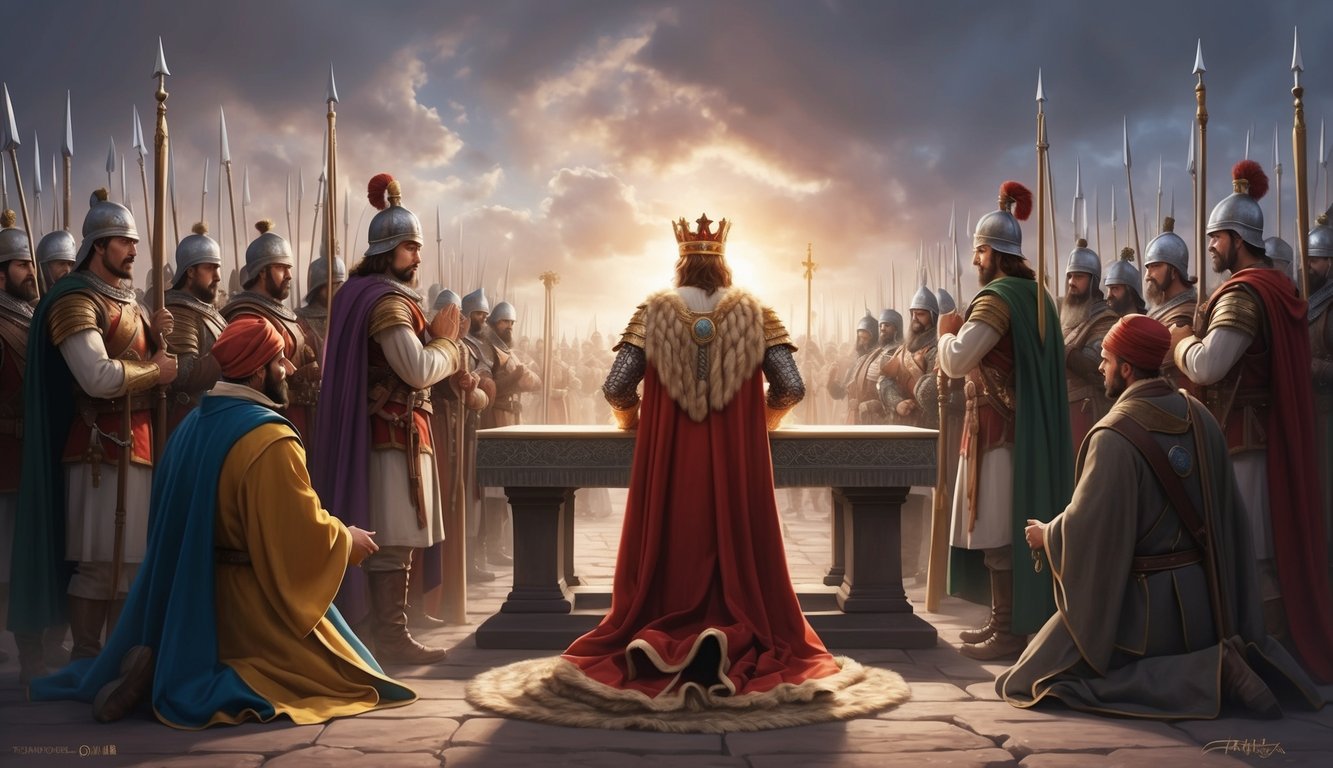Don’t Miss Out On This Unique Astrological Opportunity
Are you tired of spinning your wheels and getting nowhere? Simply put, you’re out of sync: you’re out of alignment with your astral configuration.
But: there’s a kind of map that can help you reclaim your alignment. Think of it as your own personal blueprint to success and happiness: a blueprint that will help you live your most amazing life.
Get started here.
Psalm 20 is a short but powerful passage from the Bible that invites readers into a deeper connection with divine support and protection. Traditionally, people see this psalm as a royal text, attributed to King David.
It is used in times of need for invoking divine aid. Its language and imagery reflect a strong sense of trust and reliance on a higher power, making it a significant focus for study and reflection.
The text’s historical context reveals a fascinating blend of cultural influences.
Scholars have noted striking similarities between Psalm 20 and other ancient texts, such as certain Aramaic writings.
These connections suggest broad spiritual themes shared across cultures, emphasizing the psalm’s widespread resonance.
You can explore a paganized version of Psalm 20 from Aramaic texts to see these influences in action.
Understanding this psalm’s structure and style is key to grasping its message.
The concise and fervent nature of its verses encourages believers to seek strength and courage through prayer.
Whether read in traditional Hebrew texts or in modern translations like the New International Version, Psalm 20’s themes of loyalty and faith stand out, linking ancient faith practices with contemporary spiritual needs.
Key Takeaways
- Psalm 20 emphasizes trust in divine protection.
- The psalm has ties to ancient cultural influences.
- Its themes connect past practices with modern faith.
Historical Context and Authorship

Psalm 20 is traditionally linked to King David and is believed to be a prayer for the king before battle.
It emphasizes themes of faith and divine support against external threats like Jewish unbelief and pagan idolatry, reflecting the historical and religious climate of ancient Israel.
King David as the Author
King David, known as a prolific psalmist, is traditionally credited with writing many psalms, including Psalm 20.
This psalm is often seen as a cry for divine support for the king and his army.
The mention of the Director of Music suggests it was intended for liturgical use, likely performed before battles to invoke God’s favor.
In ancient Israel, psalms attributed to David often highlight his role as both a spiritual and political leader.
His kingship is firmly rooted in God’s covenant, making his psalms not just personal prayers but communal ones, binding the people’s fate with their king’s success.
Understanding this connection helps you grasp the importance of prayer and music in reinforcing national identity and divine protection in David’s era.
Jewish Unbelief and Pagan Idolatry
During the time of David, Israel faced spiritual challenges, including Jewish unbelief and the surrounding pagan idolatry.
These elements threatened to weaken Israel’s unity and faith.
Psalm 20 reflects a response to these challenges, reinforcing trust in God over reliance on worldly powers and false gods.
The psalm encourages the community to reject idolatry and place their faith in the divine promises made to David and Israel.
By doing so, it served as both a reminder and a motivator for the people to remain steadfast in their beliefs and resist external influences.
Understanding this context helps you appreciate the psalm’s role in addressing the religious conflicts of the time.
Theological Themes and Interpretation
Psalm 20 explores the connection between divine support and human reliance on spiritual strength.
It focuses on turning to God amidst challenges, trusting in His power and grace rather than worldly means.
Dependence on God Rather Than Earthly Powers
In Psalm 20, reliance on earthly powers such as chariots and horses is contrasted with trust in the Name of the Lord.
This theme emphasizes that true security and success do not come from military might or wealth.
Instead, it highlights the importance of seeking strength from the Sanctuary, which represents God’s presence and support.
You are reminded that seeking the Lord provides a foundation more reliable than any material or human means.
The psalm encourages you to focus on faith and prayer, understanding that God’s strength transcends the limitations of human power.
Through these avenues, believers find lasting peace and confidence in facing life’s battles.
By meditating on its message, you can embrace resilience and trust in divine protection even during challenging times.
The psalm 3 meaning and relevance highlight the importance of surrendering fears and anxieties to God, knowing that His guidance provides unwavering support.
Ultimately, this fosters a deeper spiritual connection, reinforcing faith as a source of inner strength and peace.
God’s Protection and Support
This psalm depicts a powerful image of God’s right hand offering protection and deliverance.
The Lord is seen as a shield for those in need, providing shelter from spiritual enemies.
The Power of Christ, reflected in His actions, assures you of divine protection through any trial.
There’s an assurance that help comes from Holy Heaven where God hears prayers and acts in favor of His people.
This section reinforces that divine intervention is both immediate and effective.
God’s grace covers any obstacle, offering a secure path forward.
Desire and Fulfillment
Psalm 20 expresses a fervent desire for divine aid and its subsequent fulfillment.
The desires of the heart, when aligned with God’s will, are met with gracious responses.
Through prayer and trust, your needs and aspirations find fulfillment through His guidance.
This component of the psalm highlights the importance of aligning wishes with divine intentions.
It suggests that true fulfillment is not just in receiving what you ask but in recognizing God’s plan as central to achieving peace and joy.
In this context, spiritual warfare becomes a process of aligning personal desires with God’s purpose, thus ensuring their realization.
Structure and Literary Features

Psalm 20 serves as both a request and a blessing, offering support and hope.
It employs imagery and symbolic language to convey its messages, emphasizing themes of divine aid and protection.
This psalm focuses on the trust in divine power over human strength and military assets.
Psalm 20 as a Prayer and Blessing
Psalm 20 begins with a prayer for support and protection.
It asks for help from Zion and the sanctuary, showing the psalm’s religious and spiritual roots.
You’ll notice that requests are made for success in sacrifices and burnt offerings, highlighting a connection with spiritual rituals.
In this context, “Selah” is used as a pause, inviting reflection on the prayer’s meaning.
The psalm emphasizes the desire for divine intervention through a heartfelt blessing.
Confidence in divine support is shown through the wish for victory, as the psalmist trusts that the Anointed will be supported by divine power.
Use of Imagery and Symbolism
The psalm uses vivid imagery to convey its themes.
It contrasts trusting in chariots and horses with relying on divine power, highlighting the superiority of faith over physical might.
This symbolism underscores the belief in a higher power that transcends human strength.
The term “Banner” symbolizes protection and victory, serving as a rallying point for those who believe in divine intervention.
The psalmist also uses the imagery of a “sanctuary” as a place of divine presence.
This emphasizes Zion as a source of aid and hope for those seeking help.
Through these symbols, the psalm reassures believers that true power lies in spiritual trust and divine support.
Application and Relevance Today
Psalm 20 provides guidance for modern believers by emphasizing trust in divine support during life’s challenges.
This Psalm encourages you to draw spiritual strength and find joy in faith, particularly when facing adversities.
Spiritual Insight for Believers
Psalm 20 offers you a profound connection to Jesus, portraying Him as a source of strength and victory.
This Psalm urges you to rejoice in God’s promise and support.
His spirit is with you, offering guidance and comfort.
By trusting in God, you find reassurance that your prayers are heard, fostering a deep sense of love to God.
Believers find hope in the resurrection of the Lord, enhancing your faith and understanding of God’s eternal love.
This connection encourages you to remain humble, recognizing the greatness of God’s power and His care for His people.
Overcoming Trials and Tribulations
This Psalm speaks to the challenges you face, emphasizing strength in spiritual warfare.
Psalm 20 suggests that you should trust in God’s ability to defeat enemies and achieve victory, both in personal struggles and broader spiritual battles.
You are encouraged to persevere through difficulties, knowing that faith can lead to eventual triumph.
The Psalm also emphasizes humility, guiding humble believers in Jesus to seek divine assistance.
This reliance on God can inspire you to tackle problems with confidence, transforming adversities into opportunities for spiritual growth.
As you face life’s challenges, remember this Psalm’s promise of God’s constant presence and support.
Frequently Asked Questions

Psalm 20 is a powerful prayer often used to seek blessings and divine protection.
Through its verses, you can explore its significance in the biblical context, its use in personal devotion, and the impact of different translations.
What does Psalm 20 signify in biblical context?
Psalm 20 is often viewed as a prayer for victory in battle.
It expresses trust in God’s ability to protect and bless the king of Israel.
The psalm highlights themes of faith and divine intervention.
How is Psalm 20 used in personal prayer?
People use Psalm 20 as a personal prayer when seeking guidance and strength during difficult times.
Its verses can be recited to ask for God’s help and to reinforce faith in His power and protection.
What distinct blessings are mentioned in Psalm 20?
In Psalm 20, specific blessings include support from the Lord, answers to prayers, and the granting of desires.
It also mentions protection and victory, making it a source of encouragement for those seeking divine favor.
How do different translations, like NKJV and ESV, affect the interpretation of Psalm 20?
Different translations, such as the NKJV and ESV, can alter the wording and tone of Psalm 20.
These variations may influence how readers understand its messages about trust, prayer, and divine support.
What is the historical background of Psalm 20?
Psalm 20 is believed to have been used in ancient Israel during times of war.
It was likely recited by or for the king before battle, serving as a communal expression of faith and hope for divine intervention.
In what ways is Psalm 20 relevant to modern worship practices?
Psalm 20 remains relevant in modern worship as a prayer for guidance and protection.
It is often included in church services and personal devotions to seek blessings and to strengthen one’s faith in God’s provision.



